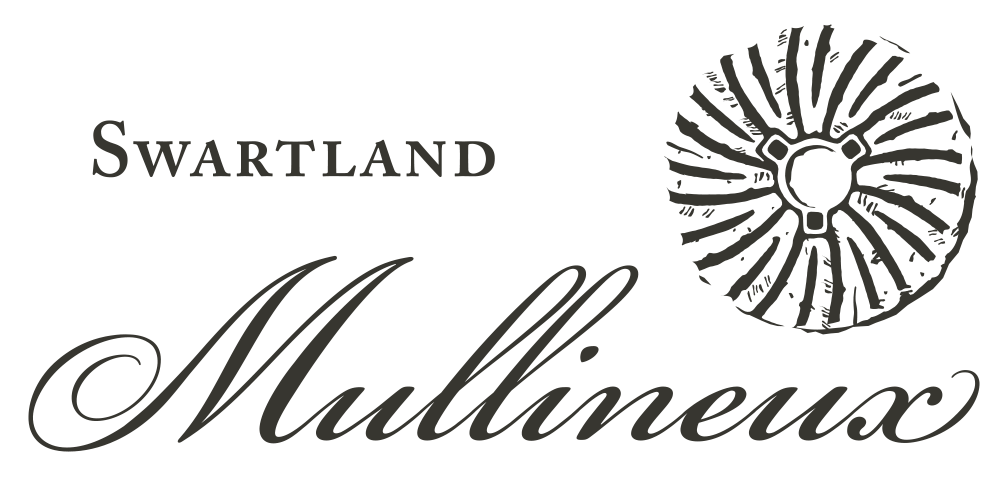Mullineux Signature, Swartland Syrah


Vintage: 2021
| Vintage | Product Code | Format | Closure | Availability |
|---|---|---|---|---|
| 2021 | MU104B21 | 6 x 75 | Natural Cork | Available |
Producer
Founded by Chris and Andrea Mullineux in 2007, Mullineux is one of the most lauded wineries in South Africa, having been named ‘Winery of the Year’ five times by the Platter Guide (in 2014, 2016, 2019, 2020 and 2023). Chris and Andrea chose the town of Riebeek-Kasteel, just west of Malmesbury in the Swartland, due to its old vineyards planted on granite and schist soils. They reasoned that, with such quality fruit, they could make outstanding wines. It is an understatement to say they have been proved right.
The Swartland is warm and dry in the summer, benefitting from a cooling afternoon breeze from the Atlantic Ocean, which borders the region to the West. Disease pressure is low, which, in turn, means spraying is kept to a minimum. The fashion for monoculture in the 1970s and 1980s bypassed the Swartland. As a result, most of the vineyards that Chris and Andrea own, or lease are planted with numerous native species like fynbos. These provide a home for native insects, which act as predators of other insects that can damage the vines. Again, this enables spraying to be kept to a minimum.
The Mullineux Range boasts a Syrah, an ‘Old Vines’ White and a ‘Straw Wine’. The Syrah blends fruit from schist, iron and granite soils across a range of Swartland vineyards. 90% of the fruit is whole bunch fermented, with maceration extended to as long as seven weeks for some batches simply because of the quality of the tannins. This creates a lovely structure and balance to the wine, with the tannins corseting ripe and voluptuous fruit. The wine is aged in oak, 15% of which is new, for 14 months before bottling. The ‘Old Vines’ White is sourced from seven low-yielding (4-6 tonnes per hectare) vineyards in the Swartland. It is predominantly Chenin Blanc, blended with a touch of Semillon Gris, Clairette Blanche, Grenache Blanc, Viognier, and Verdelho. The winemaking is similar to the Single Terroir Chenins, using whole bunch pressing and fermentation in barrel with 100% malolactic. The resulting wine is aged for 11 months in a combination of old French oak 500-litre barrels and 2,000-litre foudre. Their ‘Straw Wine’ is made from old vine Chenin Blanc harvested at normal ripeness levels and air-dried for three to four weeks, concentrating the sugars, flavours and, most importantly, acidity. The wine is slowly pressed and fermented in old barrels for six to nine months, before natural settling and bottling. The resulting wine has an intense nose of dried fruit, marmalade, marzipan and honey. On the palate, it is powerful and complex, with around 300 grams per litre of residual sugar balanced by a vibrant acidity, leaving the wine tasting fresh and dry. Mullineux’s ‘Olerasay’ Straw Wine is undoubtedly one of the world's great sweet wines and incredibly rare. Produced from barrels which have been fractionally blended for the vintages 2008 through to 2022, it has layers of complexity, nuttiness and depth.
Vineyards
A blend of six sustainably-farmed parcels from across the Swartland. Three parcels are planted on the stony shale and schist-based soils of the Kasteelberg, which contribute bold fruit. Two parcels of dry land, bush vines grown in the decomposed Granite of the Paardeberg contribute mineral freshness to the final wine. The final parcel comes from the iron rich soils west of Malmesbury, which lend structured tannins and weight. The vines are aged between 26 and 34 years.
Vintage
The severe droughts of 2015 to 2018 are not quite a distant memory, however water reserves were replenished by consistent winter rainfall. Moderate weather throughout the season, especially during harvest, resulted in slower-ripening grapes, resulting in complex aromatics and larger yields than 2020.
Vinification
The grapes were harvested by hand in the early morning. Once at the winery, 90% of the fruit was crushed as whole bunches in order to retain the characteristics of the vineyard, as well as additional structure and freshness. Cap management took place to encourage natural and gentle extraction during the indigenous fermentation which lasted four weeks. The wine was then pressed to 500 litre barrels for 11 months, followed by an additional nine months in tank. This completed the tannin development and allowed the dark aromas to flourish. It was bottled unfined and unfiltered.
Tasting Notes & Technical Details
This Swartland Syrah has superb complexity and balance. On the nose is a wonderful bouquet of fresh blackberries, violets and black olive. The structured palate follows through with intricate layers of dark plums, sour cherry and star anise and finishes with powerful and velvety tannins.
Alcohol (ABV)
14%
Acidity
5.6 g/l
Residual Sugar
2.1 g/l
pH
3.7
Other wines from this producer
Producer | Wine | Product Code | Features | Style | |
|---|---|---|---|---|---|
| Signature | Old Vines Swartland White Blend | MU103 | W | Factsheet | |
| Signature Straw Wine | MU105 | Sw | Factsheet | ||
| Olerasay 3º Straw Wine Chenin Blanc | MU117 | Sw | |||
| Single Terroir | `Granite` Swartland Chenin Blanc | MU106 | W | Factsheet | |
| `Granite` Swartland Syrah | MU108 | R | Factsheet | ||
| `Schist` Swartland Syrah | MU109 | R | |||
| `Iron` Swartland Syrah | MU110 | R | Factsheet | ||
| `Schist` Swartland Chenin Blanc | MU115 | W | Factsheet |